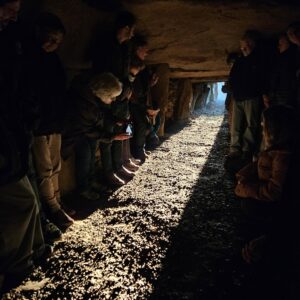
We continue our series of article in Jèrriais – Jersey’s own traditional native language. The ‘frouque’ in question is a digging fork, rather than a table fork. An English translation follows. This contribution comes from Clive Jones
LÉ POT D’CHAMBRE…..ET EUNE ÊMEUTE!
La rue ès Français à Saint Hélyi est eune rue galotée et tranchil’ye aniet. Mais en dgiêx-neuf chents ou ‘tait toute plieine dé maîsons et d’boutiques. Ou ‘tait au centre de la vie des Français à Saint Hélyi en chu temps-là.
En dgiêx-neuf chents les Français ‘taient pus nombreux qu’aniet. I’ y’ avait pus dé siêx mille Français en Jèrri, ou onze pouor-chent d’la populâtion. I’ possédaient des boutiques, des restaurants, et mênageaient tchiques-eunes des grandes hôtels dans la Ville. I’ y’ avait même un consul Français tchi d’meuthait à Saint Hélyi.
En Mai dgiêx-neuf chents, i’ y’ avait raiqu’un sujet d’convèrsâtion en Jèrri comme en Angliétèrre: lé siège dé Mafeking. En chu temps-là, l’armée Britannique s’battait en Afrique du Sud contre les Boers, les d’scendants des Hollandais tch’ avaient crée la colonnie.
Mafeking ‘tait eune ville au Nord-Vouêt du pays. Eune ville et eune base militaithe étout. Les Boers avaient encèrcl’yé la ville: ni pèrsonne ni nouôrrituthe né pouvait entrer d’dans. Ch’ ‘tait eune situâtion séthieuse pouor les soudards, mais pouor les femmes et l’s êfants étout. Tout Jèrri èrténait s’n haleine.
I’ faut dithe qu’en chu temps-là l’s autres Grands Pouvers, la France et l’Allémangne d’sapprouvaient l’s actions d’s Angliais envèrs l’Afrique du Sud et chutte d’sapprobâtion trouvait s’n écho bein haut parmi tchiques-uns des Français en Jèrri.
Lé vîngt-tch’ieune dé Mai, les Nouvelles arrivîtent: lé renfort avait arrivé – Mafeking ‘tait libéthée! I’ y’ avait eune grand’ rêjouissance et les gens s’rassemblîtent dans l’ Vièr Marchi pouor chanter des chansons patriotiques. Tout ‘tait pus ou mains calme….jusqu’à ch’qué l’s aubèrges freunmîtent….
Auprès dgiêx heuthes, un tas d’gens arrivîtent dans la rue ès Français et c’menchîtent à insulter les Français à haute vouaîx et à frapper ès portes et ès volets auve lus bâtons.
D’un co, eune haute f’nêtre s’ouvrit et eune femme, Madanme Augustine Dupont, la veuve Cousinard, lanchit “un vaissé” (s’lon la Cour dé Police) tchi cont’naît “un litchide” sus la foule.
Ch’nna énouorfantit les gens dans la rue, tchi c’menchîtent à j’ter des pièrres pouor câsser lus f’nêtres à haut et à êrachi les volets au bas. À la fîn, la police fut achouêmie et i’ téléphônitent au Fort Régent pouor du renfort.
Les troupes arrivîtent “à pas d’gŷnmnastique” et i’ rêtablîtent vite l’ordre. Mais la violence êtchèrpilyit à Saint Hélyi et des dgaîngues attatchîtent les commèrces qu’i’ crûtent êt’ la possession des Français. Par exempl’ye quarante f’nêtres à l’hôtel Pomme d’Or fûtent câssées.
Deux jours auprès, i’ y’eut des célébrâtions pus officielles dans l’ Vièr Marchi auve des stâles dé nouôrrituthe et d’la musique. La Police Salariée et La Police Honorifique toutes les deux ‘taient prêtes, des troupes étout. La rue ès Français ‘tait bliotchie. Mais acouo eune fais, i’ y’ eut un grand d’sordre auprès onze heuthes et i’ fallut qu’ les troupes avanchîssent sus la foule auve lus badgonnettes fixées.
Et auprès tout, tch’est qu’ arrivit à Madanme Dupont? À la Cour de Police, ou fut condamnée à quat’ jours de prison pouor “provocâtion d’eune êmeute” et pouor aver “salopé la rue”.
Et ch’na, chièr lecteu, est l’histouaithe du pot d’chambre et d’l’êmeute.
THE CHAMBER-POT….AND A RIOT!
French Lane in St Helier is a cobbled and quiet street today. But in 1900 it was full of houses and shops. It was in the centre of French life in St Helier at that time.
In 1900 the French were more numerous than today. There were more than 6,000 French people in Jersey, or 11 percent of the population. They owned shops, restaurants and managed some of the large hotels in town. There was even a resident French consul in St Helier.
In May 1900 there was only one topic of conversationin Jersey as in England: the siege of Mafeking. At that time the British army was fighting in South Africa against the Boers, the descendants of the Dutch who had founded the colony.
Mafeking was a town in the north-west of the country. A town, and a military base as well. The Boers had surrounded the town: neither people nor food could enter. It was a serious situation for the soldiers but also for the women and children. All of Jersey was holding its breath.
One should mention that at the time the other great powers, France and Germany, disapproved of the actions of the English over South Africa and that disapproval was loudly echoed by some of the French in St. Helier.
On 21 May the news arrived: reinforcements had arrived – Mafeking was liberated! There was great rejoicing and people assembled in the Royal Square to sing patriotic songs. Everything was more or less calm…until the pubs closed…
After ten o’clock a lot of people arrived in French Lane and began shouting insults at the French and to bang on doors and shutters with their sticks.
Suddenly an upstairs window opened and a woman, Madame Dupont, the widow Cousinard threw ‘a vessel’ (according to the magistrate’s court) which contained ‘a liquid’ on to the crowd.
That enraged the people in the lane and they began to throw stones in order to break upstairs windows and to tear off shutters. Eventually the police were overwhelmed and telephoned Fort Regent for reinforcements.
Troops arrived ‘at the double’ and quickly restored order but the violence spread in St Helier and gangs attacked businesses they thought were owned by French people. For example, 40 windows of the Pomme d’Or Hotel were broken.
Two days later more official celebrations were held in the Royal Square, with food stalls and music. Both the Paid Police and the Honorary Police were prepared, and troops as well. French Lane was blocked. But once again there was major disorder after 11 o’clock and troops had to advance on the crowd with fixed bayonets.
And after all that, what happened to Madame Dupont? At the magistrate’s court she was sentenced to 4 days in prison for ‘provoking a riot’ and for having ‘fouled the street’.
And that, dear reader is the story of the chamber pot and the riot.




